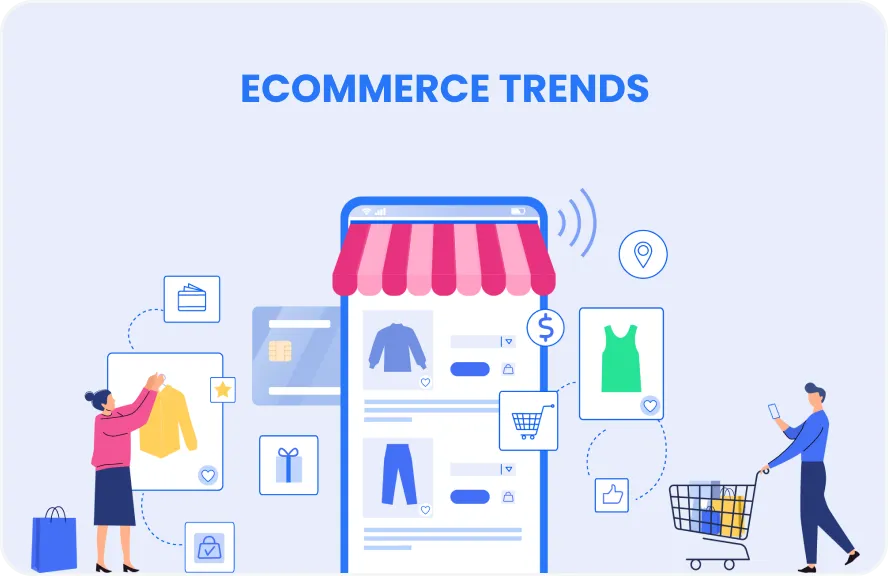eCommerce is an industry that is constantly evolving, and in order
to stay ahead of the curve, it is important to stay informed about
the latest trends and developments. In this blog post, we will take
a look at what
eCommerce Development
trends are likely to look like in 2023.
Increased Personalization
Personalization is already a trend that is gaining momentum in the
eCommerce industry, and it is expected to continue to grow in
importance in 2023. With the help of advanced technologies such as
machine learning and artificial intelligence, eCommerce websites
will be able to personalize the shopping experience for each
individual customer. This could include personalized product
recommendations, targeted marketing campaigns, and even personalized
pricing. Personalization will also extend to the way customers
interact with eCommerce websites, as chatbots and virtual assistants
become more sophisticated and able to understand natural language.
Virtual and Augmented Reality
technologies are becoming increasingly popular in the eCommerce
industry, and this trend is expected to continue in 2023. Virtual
reality allows customers to experience products in a way that is not
possible with traditional online shopping. For example, customers
will be able to see how a piece of furniture would look in their
home before they make a purchase. Augmented reality, on the other
hand, allows customers to see how a product would look on them
before they buy it. This technology is especially useful for
clothing and fashion.
The Rise of Social Commerce
Social commerce, or the use of social media platforms for eCommerce,
is a trend that is already on the rise and is expected to become
even more prevalent in 2023. Social media platforms like Instagram
and Pinterest are already being used by businesses to promote their
products, and in 2023, we will likely see more eCommerce businesses
creating social media accounts specifically to sell their products.
Social commerce is a great way for businesses to connect with their
customers, and it is also a way for customers to discover new
products and brands.
More Focus on Mobile-First Design
In recent years, there has been a significant shift towards
mobile-first design in the eCommerce industry, and this trend is
expected to continue in 2023. With the increasing popularity of
smartphones and the ease with which customers can shop on their
mobile devices, it is important for eCommerce websites to be
optimized for mobile use. This means that the design of an eCommerce
website should prioritize the mobile experience, with the desktop
experience being secondary. Mobile-first design will also lead to an
increase in the number of mobile-only eCommerce websites.
More Emphasis on Security
As eCommerce becomes more prevalent, so too does the importance of
online security. In 2023, we can expect to see an increased emphasis
on security in the eCommerce industry. This will include things like
two-factor authentication, secure payment methods, and secure data
storage. Businesses will also need to be more proactive in
identifying and preventing cyber-attacks. With more customers
shopping online, the amount of sensitive personal and financial
information stored on eCommerce websites will also increase, which
makes security even more crucial.
More Emphasis on Sustainability
Sustainability is becoming an increasingly important issue in the
eCommerce industry, and it is expected to become even more so in
2023. This includes everything from environmentally friendly
packaging to the sourcing of products. Customers are becoming more
conscious of the impact of their purchases on the environment, and
they are increasingly looking for eCommerce businesses that share
their values.
5G technology and the
Internet of Things (IoT)
are expected to have a significant impact on the eCommerce industry
in 2023. The increased speeds and capabilities of 5G networks will
enable eCommerce businesses to offer more advanced, high-quality
services to their customers. This could include things like
Virtual and Augmented Reality
experiences, real-time video chat with customer support, and faster,
more seamless transactions. The IoT, on the other hand, will allow
eCommerce businesses to collect and analyze vast amounts of data in
real-time, giving them a deeper understanding of their customers and
their behavior. This can be used to personalize the shopping
experience even further, as well as to improve supply chain
efficiency and logistics. In addition, the increasing popularity of
IoT enabled devices such as smart speakers and smart TVs will also
provide new opportunities for eCommerce businesses to engage with
customers. By leveraging the capabilities of these devices,
businesses can offer customers a more seamless and convenient
shopping experience, with voice commands and hands-free browsing
being some examples.
Increased use of AI-Powered Chatbots
AI-powered chatbots have become increasingly popular in recent
years, and this trend is expected to continue in 2023. Chatbots are
a great way for eCommerce businesses to provide customers with quick
and convenient support, 24/7. They can also be used to help
customers find the products they're looking for and to answer
frequently asked questions. With the increasing sophistication of
natural language processing and
machine learning, chatbots are becoming increasingly intelligent and able to
understand and respond to customer inquiries in a more human-like
way.
More Emphasis on Subscription-based Models
Subscription-based models, where customers pay a regular fee to
receive a product or service, are becoming increasingly popular in
the eCommerce industry, and this trend is expected to continue in
2023. This model is especially useful for businesses that sell
consumable products such as food and hygiene products, as it helps
ensure a steady stream of revenue. Subscription-based models also
help to foster customer loyalty, as customers are more likely to
stick with a product or service that they have already invested in.
Emergence of Blockchain Technology
Blockchain technology is still in its early stages, but it has the
potential to revolutionize the eCommerce industry. Blockchain is a
secure, decentralized ledger system that can be used to track and
verify transactions. In 2023, we can expect to see more eCommerce
businesses experimenting with blockchain technology, particularly in
areas such as payment processing and supply chain management.
Conclusion
The eCommerce industry is constantly evolving and in 2023, we can
expect to see a continued focus on personalization, greater use of
Virtual and Augmented Reality, the rise of social commerce, more focus on mobile-first design,
more emphasis on security, sustainability, the emergence of 5G and
IoT, increased use of AI-powered chatbots, more emphasis on
subscription-based models and the emergence of blockchain
technology. Businesses that want to stay competitive in the
eCommerce industry will need to keep an eye on these trends and look
for ways to leverage them to their advantage.

 Custom Software Development
Custom Software Development Software Testing Services
Software Testing Services Mobile Application Development Services
Mobile Application Development Services Web Application Development Services
Web Application Development Services Software Product Development Services
Software Product Development Services Ecommerce Development Services
Ecommerce Development Services AI/ML Development Services
AI/ML Development Services Vulnerability Assessment and Penetration Testing
Vulnerability Assessment and Penetration Testing AR/VR Developement Services
AR/VR Developement Services Web3 Development
Web3 Development








